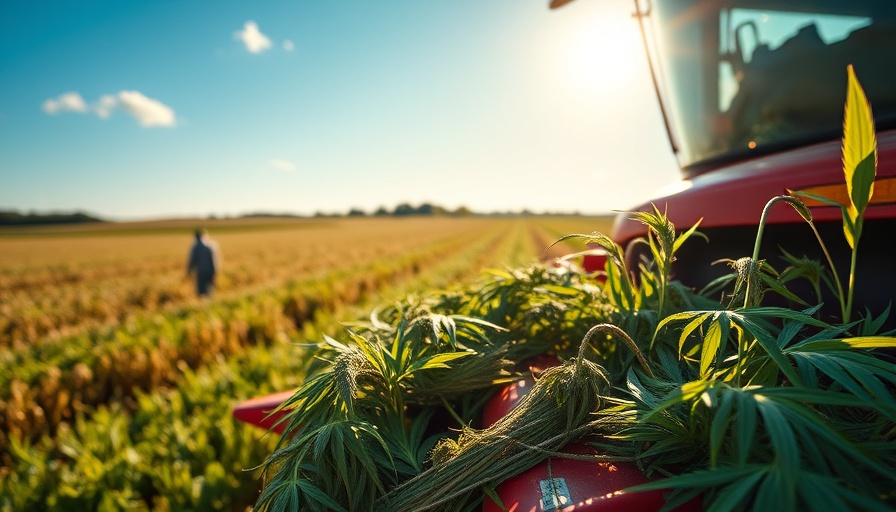
Understanding the Housing Dilemma: A Growing Crisis
The Lower Sioux Tribe is stepping into an innovative solution for the pressing housing shortage facing many in the United States. As traditional methods of addressing this issue seem increasingly inadequate, the Tribe's venture into industrial hemp production represents a noteworthy shift in strategy—one that offers both economic and social revitalization. The implications of this investment resonate far beyond just the Native American community; they present a model for how indigenous wisdom and modern agricultural practices can converge to solve contemporary dilemmas.
The Green Buffalo: Transforming Hemp into Housing Solutions
Recently, the Lower Sioux Tribe has invested in growing industrial hemp, capitalizing on its wide-ranging applications. From construction materials to biofuel, hemp could provide an economically viable route to alleviating housing shortages. This initiative reflects a growing recognition of hemp as the "green buffalo," echoing the animal’s historical significance in Native cultures as a resource. Just as bison provided multiple benefits to indigenous groups, hemp is now being recognized for its sustainability and economic potential.
Historical Context: Hemp’s Revival in American Agriculture
Historically, hemp has been part of American agriculture since the colonial era. Its diverse uses were eclipsed by the 20th-century prohibition, but recent legislative changes have spurred a renaissance for this crop. The 2018 Farm Bill federally legalized hemp, setting the stage for a surge of interest and investment. For the Lower Sioux Tribe, this means not only creating new job opportunities through cultivation but also reclaiming a significant aspect of their agricultural heritage, empowering the community economically while promoting sustainability.
Investor Interest: A New Frontier in Urban Development
For investors, the Lower Sioux Tribe's initiative offers a unique opportunity within the growing hemp market. As housing shortages continue to plague many demographics, industrial hemp could provide a viable alternative to traditional building materials. With the potential for lower costs and reduced environmental impact, investing in hemp-related ventures aligns with broader trends in sustainable housing and ecological consciousness. Stakeholders in financial planning, including wealth managers and real estate developers, should weigh the implications of this burgeoning sector on future investment strategies.
Risk Factors: Navigating the Hemp Investment Landscape
As with any emerging market, investing in hemp comes with risks. Regulatory challenges, market volatility, and exploration of new manufacturing processes pose uncertainties. However, the historical and cultural significance of industrial hemp, coupled with recent endorsement from federal legislation, suggests a stabilizing trend. Investors need to keep abreast of ongoing developments in legal frameworks and market demand, balancing potential rewards against these risks in their asset allocation strategies.
Community Impact: Building Sustainable Futures Together
The Lower Sioux Tribe’s commitment to industrial hemp is not just about financial returns; it's a concerted effort to uplift the community. By addressing the housing crisis head-on, they are fostering a holistic approach that combines economic development with cultural preservation. The potential of hemp to create jobs, support local businesses, and generate affordable housing emphasizes the Tribe’s role as a vital player in reimagining community sustainability.
Conclusion: The Path Forward for Investors and Communities
As the Lower Sioux Tribe leads the charge toward utilizing industrial hemp for combating housing shortages, investors are prompted to take a closer look at the intersection of social impact and economic opportunity. This venture exemplifies how innovative thinking and a commitment to community welfare can pave the way for sustainable financial growth. Stakeholders in financial planning and investment need to align their strategies with emerging sectors like hemp, positioning themselves to benefit from this exciting frontier in agriculture and housing.
As this movement unfolds, investors and community members alike are urged to reflect on the broader implications of sustainable practices and consider their own roles in shaping an inclusive economic landscape. Join the dialogue around hemp investment strategies and support initiatives that prioritize both financial and social returns!
 Add Row
Add Row  Add
Add 




 Add Row
Add Row  Add
Add 

Write A Comment